#bayard rustin the march on washington
Text
Watch Colman Domingo as March on Washington architect, civil rights activist & organizer Bayard Rustin in Rustin teaser trailer
Marking today’s 60th Anniversary of the March on Washington for Jobs and Freedom, Netflix has launched the teaser trailer for the upcoming Bayard Rustin biopic Rustin starring Emmy-winning Euphoria actor Colman Domingo in the title role. An often overlooked civil rights activist and organizer, Rustin was the architect of 1963’s March on Washington, working alongside Reverend Martin Luther King…
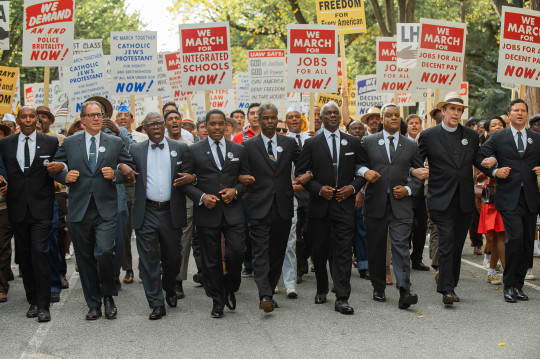
View On WordPress
#1963 march on washington#60th anniversary of march on washington#Bayard Rustin#bayard rustin the march on washington#black gay activist#black gay civil rights leader#black gay histroy#black queer history#Civil Rights#Colman Domingo#colman domingo as rustin#gay#gay film#lgbt#lgbtq#lgbtq film#LGBTQ history#LGBTQ Netflix#march on washington#queer#rustin biopic netflix#rustin film#rustin teaser trailer netflix#rustin tiff 2023#rustin trailer#The Queer Review#tiff 2023#watch the trailer for Netflix&039;s rustin
4 notes
·
View notes
Text
Interview: Colman Domingo, the 32-Year Overnight Sensation Comes Into His Own with 'Rustin' [VIDEO]
Whether you know him from Fear the Walking Dead, If Beale Street Could Talk, Make*a*Circus in San Francisco, or his Emmy-winning turn in Euphoria, you’ve seen Colman Domingo on the small and big screen for years, decades even.
Domingo is aware he has a classic ‘oh, that guy!’ star quality but finally with Rustin he gets to step into the spotlight in his first lead role in a major motion picture…

View On WordPress
1 note
·
View note
Text
Coleman Domingo Talks Rustin
"🎬✨ Exciting conversation with @colmandomingo about 'Rustin'— a compelling cinematic journey into the life of Bayard Rustin, the visionary behind the March on Washington. Get ready for an inspiring exploration of history! 🗽🔥 #RustinFilm #ColemanDomingo
“I had the opportunity to interview Coleman Domingo about his film ‘Rustin,’ which highlights Bayard Rustin, the architect of the March on Washington.”
Coleman Domingo and Reggie Ponder, The Reel Critic
youtube
View On WordPress
#AAFCA#african american#Bayard Rustin#Coleman Domingo#Dr. Martin Luther King Jr.#film#George C. Wolfe#movies#Netflix#Reggie Ponder#Rustin#The March on Washington#The Reel Critic#Youtube
0 notes
Text
60th Anniversary Of The March On Washington Celebrates Racial Unity & Collective Resistance To Extremism | Chicago Defender
#civil rights movement#civil rights#black excellence#civil rights march#washington dc#march on washington#martin luther king jr#josephine baker#bayard rustin#coretta scott king
0 notes
Text
Angelic Troublemaker: Bayard Rustin (ENCORE)
On today’s show, we bring you a special encore episode from our archives to honor Black history and heritage. We take a look at the life and legacy of Bayard Rustin, one of the most central figures in the African American struggle for civil rights and freedom. He was known as the lead organizer of the 1963 March on Washington and trusted advisor to labor leader A. Phillip Randolph and Dr.…
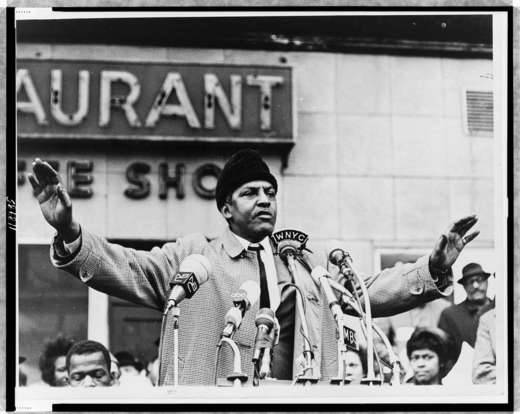
View On WordPress
#Bayard Rustin#Civil Rights#Economic Justice#freedom#gender#LGBTQ#March on Washington#MLK Jr.#non-violence#race#Sexuality
1 note
·
View note
Text
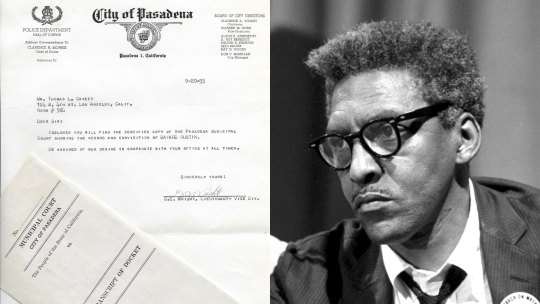
Nearly 70 years ago, civil rights leader Bayard Rustin was arrested, served 50 days in Los Angeles County jail, and had to register as a sex offender with the state due to a charge of “vagrancy” after he was seen being intimate with two men in a parked car. In 2020, Rustin was posthumously pardoned by Governor Gavin Newsom.
Rustin was close to Martin Luther King Jr., was an organizer of the 1963 march on Washington, and assisted with other nonviolent protests and boycotts for civil rights.
From the official pardon: “California, like much of the nation, has a disgraceful legacy of systematically discriminating against the LGBTQ community. This discrimination has taken many forms including social isolation and shaming, surveillance, intimidation, physical violence, and unjust arrest and prosecution. Mr. Rustin was sentenced pursuant to a charge commonly used to punish gay men for engaging in consensual adult sexual conduct. His conviction is part of a long and reprehensible history of criminal prohibitions on the very existence of LGBTQ people and their intimate associations and relationships. … Mr. Rustin was criminalized because of stigma, bias, and ignorance. With this act of executive clemency, I acknowledge the inherent injustice of this conviction, an injustice that was compounded by his political opponents' use of the record of this case to try to undermine him, his associates, and the civil rights movement.”
152 notes
·
View notes
Text

Happy birthday, A. Philip Randolph! (April 15, 1889)
A major figure in the Civil Rights Movement and in the American labor movement, Asa Philip Randolph was born in Crescent City, Florida, and grew up in the Black community of Jacksonville. Randolph was an intellectual from a young age, and graduated valedictorian from his high school. However, the Jim Crow policies of the segregated South stifled his ability to further his education or career, and so he traveled north to New York City, settling in the thriving Black community of Harlem. Randolph was a socialist inspired by such figures as W.E.B. Du Bois, whose The Souls of Black Folk was highly influential on the young Randolph. He became an activist in New York City, emphasizing collective community action in his organizing, and ran for office several times on the ticket of the Socialist Party. Randolph also became active in organizing labor unions, helping to found the Brotherhood of Sleeping Car Porters, the first Black-led union to charter with the AFL-CIO. The Brotherhood, led by Randolph, would wage a decade-long struggle, ultimately victorious to achieve a union contract with the Pullman Company, a longtime foe of organized labor. The BSCP's victory over Pullman raised Randolph's profile considerably, and he became one of the most well-known Black people in America, using this new platform to champion Black civil rights. Randolph was a leader in the Civil Rights Movement from its early days into its heyday, and would coordinate with other leaders such as Bayard Rustin and Martin Luther King, Jr. on several actions, most notably the March on Washington in 1963. Randolph died in 1979, after many decades of struggle.
"Freedom is never granted: It is won. Justice is never given: It is exacted."
143 notes
·
View notes
Text
youtube
RUSTIN | Official Teaser Trailer
The architect of 1963’s momentous March on Washington, Bayard Rustin was one of the greatest activists and organizers the world has ever known. He challenged authority, never apologized for who he was, what he believed, or who he desired. And he did not back down. He made history, and in turn, he was forgotten. Directed by DGA award and five-time Tony award winner George C. Wolfe and starring Emmy award winner Colman Domingo, Rustin shines a long overdue spotlight on the extraordinary man who, alongside giants like the Reverend Martin Luther King Jr., Adam Clayton Powell Jr., and Ella Baker, dared to imagine a different world, and inspired a movement in a march toward freedom.
Produced by Academy award winner Bruce Cohen, Higher Ground's Tonia Davis and George C. Wolfe.
#Rustin#Bayard Rustin#Colman Domingo#George C. Wolfe#Chris Rock#Glynn Turman#Jeffrey Wright#Audra McDonald#movie trailer#Dr. Martin Luther King Jr#Adam Clayton Powell Jr.#Ella Baker#Youtube
50 notes
·
View notes
Photo
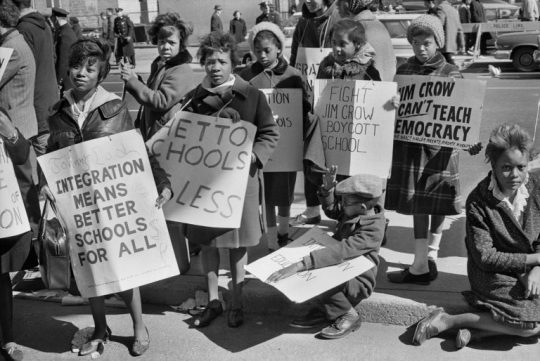
On this day, 3 February 1964, one of the biggest protests as part of the civil rights movement took place when over 450,000 students in New York City boycotted class in protest at de facto segregation in the city's public schools. Primarily Black and Puerto Rican schoolchildren skipped class and instead took to the streets with parents and activists, holding rallies and alternative classes across the city. The action was organised by gay civil rights activist Bayard Rustin, and was joined by some teachers who went on unofficial strike. While the action was one of the biggest of the time, and involved twice as many people as the famous March on Washington, it is little-known and rarely mentioned in history books. Some historians believe this is because the narrative of segregation which is "acceptable" to be taught is about segregation in the "backwards" US South, not in the liberal major northern cities. There was a follow-up boycott the following month, of just over 250,000 schoolchildren, but the boycott was unsuccessful in forcing changes in NYC schools. As of 2021 New York schools were still the most segregated schools in the US. More info, sources and map in our Stories web app: https://stories.workingclasshistory.com/article/10176/new-york-city-school-boycott https://www.facebook.com/workingclasshistory/photos/a.296224173896073/2201587303359741/?type=3
238 notes
·
View notes
Text
Everyone should watch Rustin – the latest Netflix film. It celebrates the life and legacy of Bayard Rustin, a giant of the civil rights movement and the architect of the 1963 March on Washington.
I am so happy his incredible story is being told finally. Bayard Rustin was incredibly smart, strategic, brave and charismatic. He is a pioneer of civil rights, nonviolence, and gay rights. We owe so much to this incredible man and we don't talk enough about him.
He did so much for us and it should be recognized.
#rustin#bayard rustin#imagine loving your country so much when it hates everything you are#i am so grateful my dad introduced me to his story#I did my first book report on him
34 notes
·
View notes
Note
im usually prettt good with deciphering american culture but i still dont know what a quaker is in its entirety

although i love quakerism and attend meetings sporadically, i am not a quaker myself (yet- we'll see). additionally, there are many different kinds of quakers (for instance, evangelical versus programmed quakers) but i'll try to give a general overview.
quakers, formally known as the religious society of friends, are a historically christian denomination group which developed during a period of religious unrest during and after the english civil wars and the english reformation. george fox is recognized as the founder of the quaker movement. quakers reject religious ceremony and episcopal hierarchy. although quakerism was founded in england, religious persecution (the term "quaker" was actually somewhat pejorative: george fox wrote in 1650 that, "Justice Bennet of Derby first called us Quakers because we bid them tremble at the word of God") led many to migrate to north america in the mid-1650s.the guiding principle of quakers is generally considered to be the idea that every human being has the capacity to experience "the light within" or "answer that of God in everyone." quakers are perhaps best known for their advocacy: they have been involved in abolitionism, women's rights, and civil rights, and continue to advocate for non-violence in accordance with their belief in pacifism.
quaker.org gives a highly accessible overview of their beliefs and practices.
additionally, you can access some of the writing of early quakers here.
bayard rustin, the organizer of the march on washington, was a quaker; another famous quaker is this website's beloved public universal friend; and both joan baez and, weirdly, hozier were raised in the society of friends.
#replies#i know there are quakers following me that i am too shy to tag so please feel free to correct or add to this if you feel called to skdfjgdf
21 notes
·
View notes
Note
I'm sorry the WHAT

there is something about using the toothpaste flag for bayard rustin, the civil rights activist who organized the march on washington, was arrested and convicted for sodomy, blackmailed by the FBI for being gay, and later forcibly outed for an american girl doll themed history post that I find a bit unsettling
401 notes
·
View notes
Text
Thoughts on Netflix's Rustin
I watched Rustin over the weekend. I really liked it Colman Domingo was fantastic and deserves his nominations. The film focuses on the conception and development of the 1963 march on Washington DC and how Bayard Rustin's involvement was downplayed because he was an unashamed gay man. One character is supposedly mostly made up, Rustin's main love interest. I think they did think to give Rustin a black love interest, I don't know if he was interested in black men, but the two known long term partners he had were white. But it also shows what closeted black men of the time went through. There is a white staffer that Rustin has a passing fling with, but he's more into Bayard than Bayard is into him.
Also, there's a portrayal of baby John Lewis
It makes me want to be a low key modern day Rustin. Something to aspire to.
7 notes
·
View notes
Photo
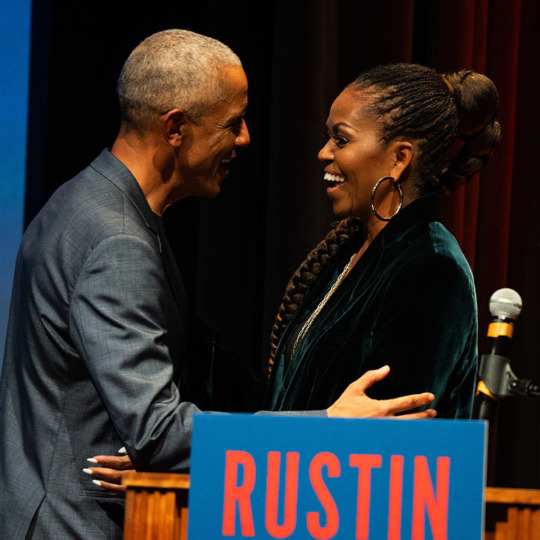
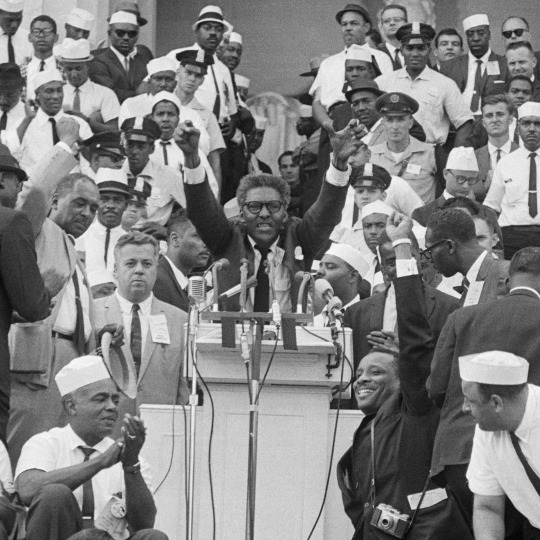

What better way to honor the legacy of Bayard Rustin, the civil rights leader who organized the 1963 March on Washington, than by sharing his story with the world? 🙌🏿
#Rustin makes its official debut on Netflix this Friday, November 17th. Mark your calendars! 🎬
14 notes
·
View notes
Text
Angelic Troublemaker: Bayard Rustin (ENCORE)
Angelic Troublemaker: Bayard Rustin (ENCORE)
On today’s program we honor Bayard Rustin, one of the most central figures in the African American struggle for Civil Rights and Freedom. Rustin was a pacifist, homosexual and practitioner of nonviolence who dedicated his life to racial equality, economic justice and ending warfare. Known as the lead organizer of the 1963 March on Washington and trusted advisor to labor leader A. Phillip…
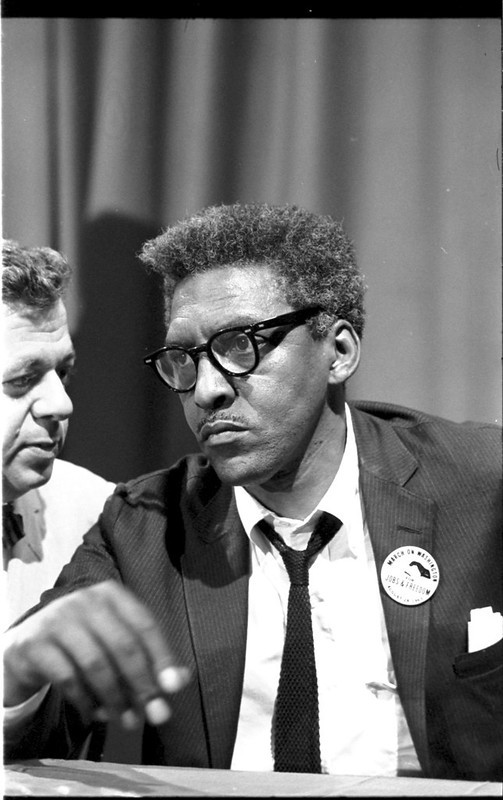
View On WordPress
#Bayard Rustin#Civil Rights#Economic Justice#freedom#gender#LGBTQ#March on Washington#MLK Jr.#non-violence#race#Sexuality
0 notes
Text
MOGAI BHM- Belated Day 19!
happy BHM! today i’m going to be talking about Bayard Rustin!
Bayard Rustin-
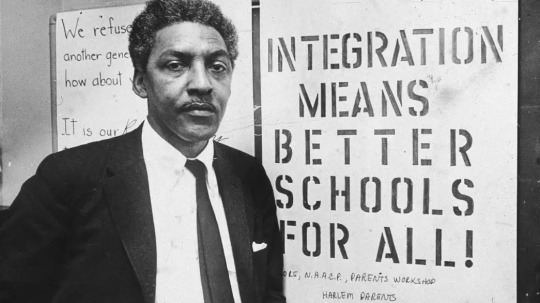
[Image ID: A black-and-white photograph of Bayard Rustin, a thin Black man with slightly greying, short frizzy hair. In the photo, he has a deadpan expression on his face and is wearing a black necktie, a white collared undershirt, and a black suit jacket. He is standing by a sign on a wall that says in large block text “INTEGRATION MEANS BETTER SCHOOLS FOR ALL!”. Below that, in small scribbled print, it says “N.A.A.C.P, PARENTS WORKSHOP HARLEM PARENTS”. There is another, smaller sign behind Rustin that is partially obscured by him, but what can be seen of it says “We refuse... another gene... how about... It is our...”. End ID.]
Bayard Rustin, a man who is frequently considered to have been Dr. Martin Luther King Jr.’s “right-hand man”, is a civil rights activist who has been largely erased from the Black history taught in schools, and from the general population’s knowledge and perception of the Civil Rights Movement- but he was an integral part of the movement, and his erasure has largely to do with the fact that he was openly and unapologetically gay.
Bayard Rustin was born in 1912 in Pennsylvania, where he was raised by a Quaker family who very early on instilled in him the principles of nonviolence, which laid the foundation for his involvement with the civil rights movement. At a young age, he was interested in civil rights and racial justice, and at first, the racially progressive views of the Young Communist League attracted him to join. Eventually, their politics changed and he left the league.
In 1941, he turned his sights to socialism by joining the Fellowship of Reconciliation (FOR), who at the time advocated for equal rights for all people (except, as he would later find out, gay people). That same year, he met two other men who would be influential in his life- A.J Muste, the leader of the FOR, and Phillip A. Randolph. With these two men, he helped propose the March on Washington that convinced FDR to sign the executive order that allowed Black workers into the defense industry, and in 1944, Bayard Rustin was arrested as a “conscientious objector” because he refused to sign up for the draft for WWII, to which he was staunchly opposed.
However, in 1953, Bayard was fired from his position in the FOR after being arrested and charged with “sex perversion” for having sex with another man. At the time, many people feared that open discussions of homosexuality would threaten the image and therefore ultimately the credibility and impact of the civil rights movement, so Bayard, along with many other Black queer people, were often targeted for their identities, either being forced to hide them or be careful with them, or having their identities completely used against them to disparage their credibility within the movement.
During the late 1940s, Bayard Rustin helped to co-found the Congress of Racial Equality, or CORE, which became one of the most central civil rights organizations in the civil rights movement. In 1947, he participated in FOR’s “Journey of Reconciliation” (discussed more in this post) which provided the blueprint for the Freedom Rides of the 1960s, which led to the illegalization of interstate bus segregation.
In 1956, Randolph, who had become Rustin’s mentor, urged him to meet with Dr. Martin Luther King Jr. amidst the Montgomery Bus Boycott. When Rustin agreed, he and several other key pacifists of the movement met with King and were instrumental in convincing him to more fully adopt nonviolence as a way of life. Bayard Rustin’s upbringing in nonviolence led to it being one of the cornerstones of the civil rights movement.
Over the next couple of years, Bayard became part of King’s “inner circle” of close associates within the civil rights movement. He held a key position in King’s organization, the Southern Christian Leadership Conference, which he had helped to found, and he was behind many efforts of integration. He helped to organize many key events, like the Prayer Pilgrimage for Freedom, and the Youth Marches for Integrated Schools. However, in 1960, he reluctantly agreed to step away from the SCLC and from Dr. King, because the Democratic Convention threatened to publish a rumor that King and Rustin were romantically and sexually involved, using Bayard’s orientation against him, if they followed through with a protest against the convention that they’d been planning. Bayard himself was very disappointed with the way King didn’t stand up for him, but he also acknowledged that it was probably best for the movement that he step away.
In the following years, he got involved outside of the scope of the SCLC. He did community organizing, and eventually, in 1963, he was reintegrated into King’s campaign through the Birmingham Campaign. It was then that he made his most notable and significant contribution to the Civil Rights Movement. He had strong organizational and strategic skills, and people who worked with him knew that there was no better man to re-energize the movement through a strategic march, than Rustin- and thus began the plan that brought to fruition Bayard’s previous plans of a march on Washington.
Many people involved were still against Bayard being involved- including John Lewis, a prominent member of the SNCC, and Roy Wilkins, a prominent chair of the NAACP. Their reservations were largely against both his sexuality and his previous communist affiliations, so it was agreed that instead, his mentor, Philip A. Randolph, would be elected to lead the march, so that he could then, in secret, choose his mentee, Bayard Rustin, to lead the march from behind the scenes.
So, within a time span of eight weeks, Bayard Rustin organized the infamous 1963 March on Washington. He spent those weeks incessantly writing letters and organizing with others. It was an extremely chaotic environment, but he was very focused and determined, and when the march happened, it singlehandedly re-energized the Civil Rights Movement and is remembered to this day as a monumental moment from the movement. From it, King’s famous “I Have A Dream” speech was born. Thanks to Rustin’s tireless efforts, the movement regained a lot of steam.
After that point in time, more people, including King himself, began to come out in support of Rustin, causing the accusations against him to lessen their effectiveness, although many within the movement were still against his involvement. For the rest of his life, Bayard Rustin remained a committed part of the Civil Rights Movement, and his contributions cannot be overstated. He was a proud gay Black man and he fought for his rights in the face of adversity from every angle.
tagging @metalheadsforblacklivesmatter @bfpnola @intersexfairy @cistematicchaos
Sources-
https://www.history.com/news/bayard-rustin-march-on-washington-openly-gay-mlk#:~:text=Why%20MLK's%20Right%2DHand%20Man,...and%20openly%20gay.&text=Jun%201%2C%202018-,Bayard%20Rustin%20was%20an%20indispensable%20force%20behind%20the%20Civil,...and%20openly%20gay.
https://kinginstitute.stanford.edu/encyclopedia/rustin-bayard
https://www.history101.com/bayard-rustin-mlk-right-hand/
32 notes
·
View notes